

Perestroika and Glasnost - Cold War. The Gorbachev initiative that had the most far-reaching effects was his decision to abandon Soviet control of the Communist nations of Eastern Europe.
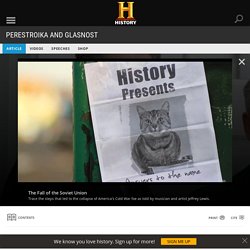
Since World War II, leaders of the USSR had viewed the maintenance of these states as essential to their nation’s security, and they had crushed anti-Soviet uprisings in Warsaw Pact countries (a group of eight Communist nations in Eastern Europe, including Poland and Hungary) that sought greater independence. However, just a year after taking power, Gorbachev oversaw reforms that loosened the Soviet grip on these states. Then, in a landmark December 1988 speech at the United Nations, he declared that all nations should be free to choose their own course without outside interference. Nikita Khrushchev - Cold War. Once a loyal Stalinist, Khrushchev gave a long speech in February 1956 that criticized Stalin for arresting and deporting opponents, for elevating himself above the party and for incompetent wartime leadership, among other things.
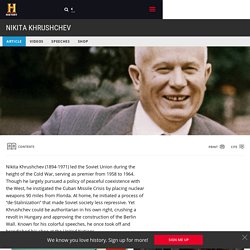
This withering, albeit incomplete, indictment of Stalin was supposed to remain secret. By that June, however, the U.S. State Department had published the complete text. Starting in 1957, Khrushchev made some minor attempts to rehabilitate Stalin’s image. But he switched course once again in 1961, when the city of Stalingrad was renamed and Stalin’s remains were removed from Lenin’s mausoleum in Moscow’s Red Square. Emboldened by Khrushchev’s so-called “secret speech,” protestors took to the streets in the Soviet satellites of Poland and Hungary. On the domestic front, Khrushchev worked—not always successfully—to increase agricultural production and raise living standards.
Nikita Khrushchev. Nikita Khrushchev was the leader of the Soviet Union during the Cuban Missile Crisis of 1963.
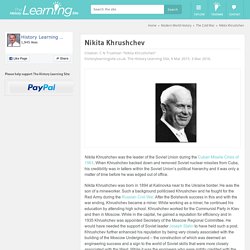
When Khrushchev backed down and removed Soviet nuclear missiles from Cuba, his credibility was in tatters within the Soviet Union’s political hierarchy and it was only a matter of time before he was edged out of office. Nikita Khrushchev was born in 1894 at Kalinovka near to the Ukraine border. He was the son of a mineworker. Such a background politicised Khrushchev and he fought for the Red Army during the Russian Civil War. After the Bolshevik success in this and with the war ending, Khrushchev became a miner. Between 1938 and 1947, Khrushchev was mainly involved in affairs that affected the Ukraine. In 1947, Stalin selected Khrushchev to reorganise the Soviet Union’s agricultural production.
In January 1956, Khrushchev made his boldest move for power. Whether Khrushchev was a ‘hawk’ or a ‘dove’ is also difficult to tell. Leonid Brezhnev. Leonid Brezhnev: Lets agree not to bury ourselves in the past, but to discuss calmly, proceeding from the situation that has developed, in order to find a solution that will work to the benefit of the Czechoslovak Communist Party so that it can act, normally and independently along the lines laid down by the Bratislava Declaration Let it be independent.
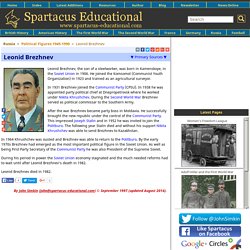
We don't want and we're not thinking of further intervention. And let the leadership work according to the principles of the January and May plenary sessions of the Central Committee of the Czechoslovak Communist Party. We have said this in our reports and we're prepared to affirm it again. Of course, we can't say that you re in a good mood. But your moods aren't the point. Leonid Brezhnev. Leonid Ilyich Brezhnev was the archetypal Soviet politician associated with classic Cold War politics in the 1970’s.
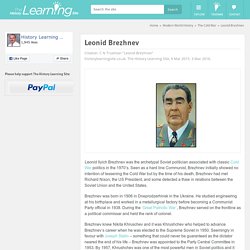
Seen as a hard line Communist, Brezhnev initially showed no intention of lessening the Cold War but by the time of his death, Brezhnev had met Richard Nixon, the US President, and some detected a thaw in relations between the Soviet Union and the United States. Brezhnev was born in 1906 in Dneprodzerhinsk in the Ukraine. He studied engineering at his birthplace and worked in a metallurgical factory before becoming a Communist Party official in 1938.
During the ‘Great Patriotic War’, Brezhnev served on the frontline as a political commissar and held the rank of colonel. Brezhnev knew Nikita Khruschev and it was Khrushchev who helped to advance Brezhnev’s career when he was elected to the Supreme Soviet in 1950. Gorbachev, Reagan and the End of the Cold War. This is one of the better books on the end of the Cold War.
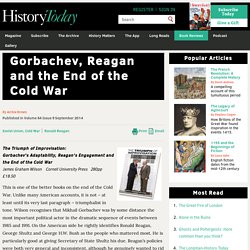
Unlike many American accounts, it is not – at least until its very last paragraph – triumphalist in tone. Wilson recognises that Mikhail Gorbachev was by some distance the most important political actor in the dramatic sequence of events between 1985 and 1991. On the American side he rightly identifies Ronald Reagan, George Shultz and George H.W. Bush as the people who mattered most. He is particularly good at giving Secretary of State Shultz his due. Ronald Reagan and The Cold War: a summary. The End of Detente Reagan, a fervent anti-communist, had campaigned on an anti-detente ticket.
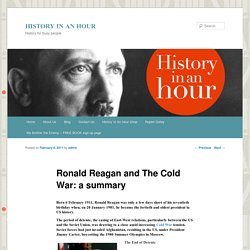
What was détente, asked Reagan rhetorically in 1978: “Isn’t that what a turkey has with his farmer until Thanksgiving Day?” On coming to office, having easily beaten Carter in the 1980 presidential elections, Reagan went straight onto the offensive, increasing military spending, and calling the Soviet Union an “evil empire.” Of course, such language did nothing to improve the already deteriorating situation.